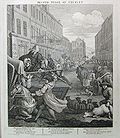The Four Stages of Cruelty is a series of four printed engravings published by William Hogarth in 1751. The prints depict the progression of the fictional Tom Nero, from a cruel child to his ultimate fate: the ignominy of dissection after his execution as a murderer. Beginning with the torture of a dog as a child in the First stage of cruelty, he progresses to beating his horse as a man in the Second stage of cruelty, and then to robbery, seduction, and murder in Cruelty in perfection. Finally, he receives what Hogarth warns is the inevitable fate of those who start down the path Nero has followed: his body is taken from the gallows and mutilated by surgeons in the anatomical theatre in The reward of cruelty. The prints were intended as a form of moral instruction: Hogarth was dismayed by the routine acts of cruelty he witnessed on the streets of London. Issued on cheap paper, the prints were destined for the lower classes. The series shows a roughness of execution and a brutality that is untempered by the humorous touches common in Hogarth's other works, but which he felt was necessary to impress his message on the intended audience. Nevertheless, the pictures still carry the wealth of detail and subtle references that Hogarth had made his trademark.
